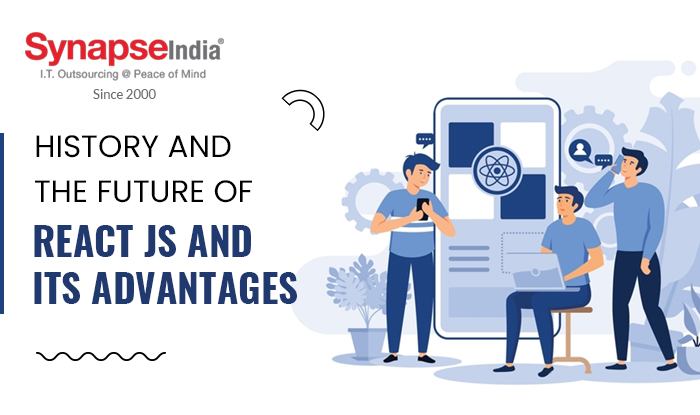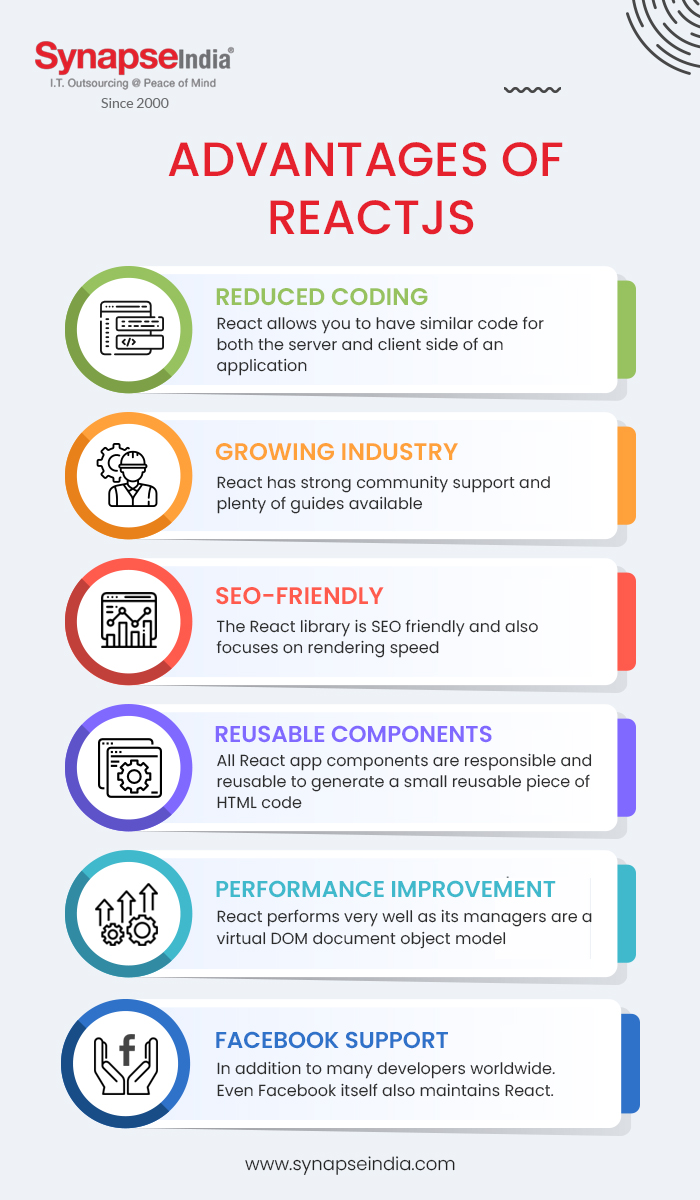 18 Jul 2022
18 Jul 2022
ReactJS is a flexible, declarative JavaScript framework for building user interfaces that are more responsive and usable. A multi-state application has several advantages in terms of generating basic views and making it easy to modify and display associated components as data changes.
React.js is one of the most important frontend libraries you can use in JavaScript programming today. It allows you to design highly responsive user interfaces with a fast, mobile app-like user experience.
As a developer, you should focus on constructing modules declaratively with React, after that React will take care of the rest. You can rely on its fast and efficient internal rendering process to deliver an exceptional user experience.
New frameworks in web development are being developed to address the limitations of previous libraries or frameworks. Many of the bugs in previous versions, such as AngularJS, have been fixed in ReactJS. ReactJS is used to build fast and scalable web applications, and new plugins are created as the need for more features grows.
So, today this blog is going to dive into future and history of ReactJS and benefit of ReactJS, one of the fast-growing JavaScript front-end libraries. But first, let's take a look at its journey.

Facebook programmers realized the need for a fast and efficient application development JS library. So, they introduced xhp, which allowed you to create composite components. This xhp syntax was later used in React.
Now is the right time to name the inventor of ReactJS: Jordan Walke. He was the software engineer for Facebook. Jordan realized the need for a ReactJS JavaScript library. The first version was called FAXJS.
In 2012, Facebook acquired Insta. Consequently, ReactJS became the innovation that Instagram needed (in technological terms, obviously!). This led to...wait for it...
Facebook publicly open sourced ReactJS in May 2013. Initially, people were skeptical about the library. However, over time, ReactJS has become one of the favorite app development technology stacks for developers.
Gradually React gained stability and recognition among the larger community. Large companies began to take note of the language.

In 2015, Jordan Walke publicly unveiled a powerful React Native framework. This framework revolutionized application development in the true sense. Also, big companies like Airbnb and Netflix adopted React.
In 2016, React gained more recognition with new conferences. New libraries such as BlueprintJS and MobX were released, which were highly appreciated by the developing communities.
React tools have been updated and improved. Subsequently, we saw new releases from the library and conferences were held globally.
The year 2019 saw the release of the novel React DevTools.
In 2020, they introduced zero package size React server components to receive initial feedback from the React development community.
It is a powerful library that is here to stay and will be used to build applications that will take over the world. We are seeing great things to come in the future
After knowing the history of ReactJS lets understand about what does the future hold for ReactJS in web development.
Everyone wants their web applications to be visible on search engines to attract maximum traffic and business. Now there are many SEO best practices following and building your app with React is one of them. With React, there are no full-page refreshes, which means pages can load in less time and search engine crawlers will find the content on your site much faster. If you want to build a high-quality SEO-friendly app, ReactJS is the way to go.
Imagine that you have to refresh every time you scroll through the Facebook feed. That's what SPAs prevent. Single page apps provide a rich user experience as they fetch data in the background, delivering responsive results as users navigate. Since SPAs need to constantly update content based on data from their web server, there is no technology as good as React. Its features allow it to handle constantly updating content efficiently.
Read More: Type of web applications that can use MEAN Stack for development
JavaScript is the programming language of the web. ReactJS is one of the best frameworks that allow you to create user interfaces and other programs for web applications through JavaScript. It has been gaining popularity in recent years because it is fast, simple, and efficient. You can see his quickness in the New York Times. They adopted React to make their site faster and more accessible to users. And today it appears as a competitive and totally immersive digital media company. Above all, it is open source and offers strong capabilities to modify its source code to perfectly fit the requirements of the project. Therefore, ReactJS will be the top choice for businesses and startups because it has all the necessary features for a robust web application.

You must be thinking why to use ReactJS. After all, we have multiple options available in the market despite React Native app development, but why React? We are going to explore:
Among other things, our specialists personally explain why we use React JS for web development by highlighting an exemplary set of tools and technology. React Developer Tools along with Redux Development Tools offer extremely convenient capabilities, while you can easily install and use them like regular Chrome extensions. Specifically, with its help, you can efficiently inspect React-based hierarchy components, check submit actions, and see state changes immediately in the extension.
Using React.js for web development can be extremely convenient because React is one of those cases where you master a single technology to easily reuse it across a variety of platforms. And all because it is a library by nature, with the main purpose of creating separate web design elements and components.
On top of that, there is significant contribution from the long-established and extensive community. The current React ecosystem is so vast that it allows developers to build desktop solutions and mobile applications, generate static websites, handle server rendering, and integrate advanced technology concepts with web solutions, all with web application development guidelines and philosophies. Simple React and the like.
We answer the last question above: what is React.js used for in web development in particular? To create separate components. And this is exactly the reason why the created components can be easily reused. Once you've created a React.js web app part, you'll have a single object that can be added to any other project that supports React-based code.
While a larger overall hierarchy is built from those components, each has a separate dedicated internal logic and rendering principle. This provides excellent scaling opportunities, helps achieve much better consistency of the React web app, and makes further support and optimization a doddle.
Also Read: Can all data intense applications use Mongo DB for development
While there are several similarities between ReactJS and React Native, there are also some notable differences. Let's take a look:
If you are looking for a ReactJS development team, connect with SynapseIndia. Our professionals will assist you with best of their knowledge. Moreover, you can go through our portfolio to know more about our work!

